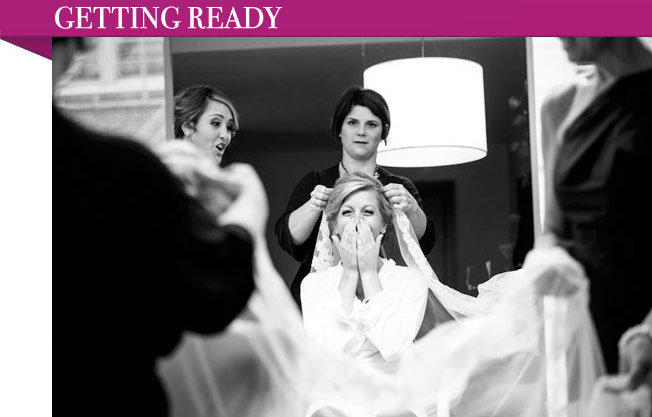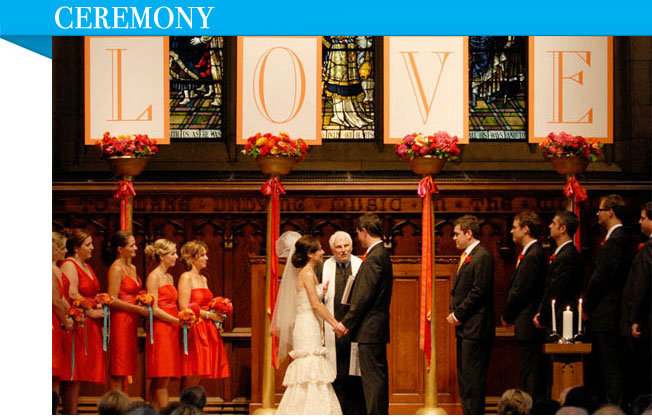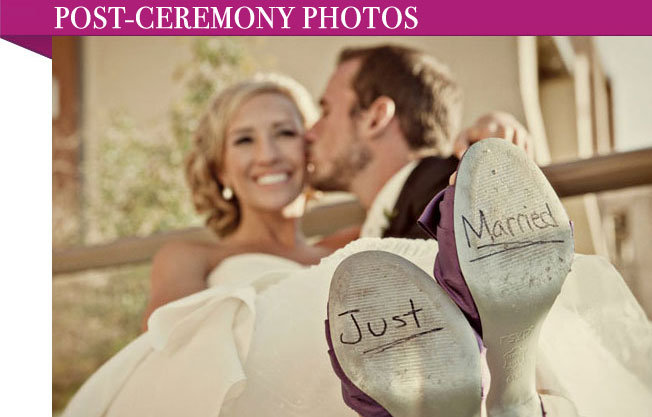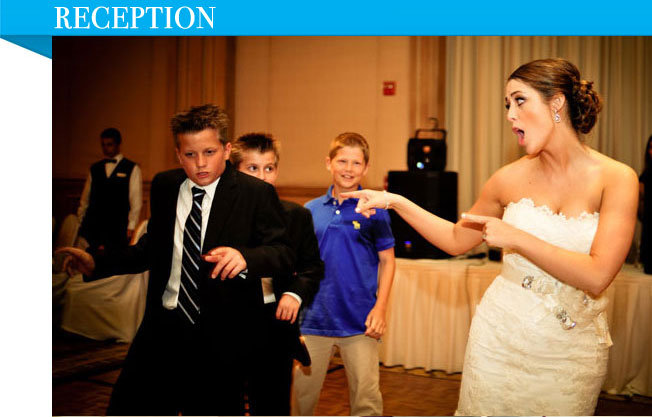Complete Wedding-Day Timeline

Photo Credit: Husar PhotographyBride’s hair: One hour. “This gives enough time to get it right and make any tweaks or changes from the trial run,” said hair stylist Kacee Geoffroy.
Bride’s makeup: 45 to 60 minutes, depending on the makeup style the bride selects, according to makeup artist Erica of 10.11 Makeup.
Bridesmaids’ hair: 30 minutes per person.
Bridesmaids’ makeup: 45 minutes per person.
The order: When your hairstylist arrives, have her start on your bridesmaids first. “I prefer to have the bride go last so that when her photographer arrives, they catch those last-minute ‘getting ready’ shots, and the bride looks the freshest,” said Geoffroy.
Instead, the bride should start with makeup. “We like to prep the bride’s face first, let her relax and enjoy the day, and then allow her the last two hours of time for final styling,” said Erica. “But it depends on the bride’s preference as well. Regardless, with proper makeup application, her look will last.”
When should the photographer arrive? One hour before the bride is ready to go. “It’s generally best to arrive during the bride’s hair and makeup. The latter portion of the hair and makeup styling, when the bride is closer to being finished, makes for more flattering photos,” said photographer Suzy Clement. This also gives your photographer plenty of time to capture the details — gown, shoes, jewelry, etc. — in addition to the hustle and bustle of the room and the often emotional interactions between the bride and her bridesmaids and relatives,” said Clement.
If you have more than yourself plus four getting hair done, ask your stylist to bring an assistant to cut down on time. For makeup, add an assistant after yourself plus two.
If you’re traveling to a salon, double the travel time you anticipate — better to have too much time than not enough, advises Geoffroy.
Put on your veil after the dress. Consider asking your stylist to stick around until then to make sure your veil is secure.
Pre-ceremony photos of the bride with her family and attendants/groom with his family and attendants: Two to three minutes per shot; more if the groups are very large, and less if they are very small. “You must also consider how punctual the groups tend to be and possibly cushion the schedule to allow for unexpected delays,” said Clement.
First look: 15-30 minutes.

Photo Credit: Susan Jackson PhotographyGroom and groomsmen arrive: An hour and a half before the ceremony.
Bride and bridesmaids arrive: An hour* before the ceremony. “We want to make sure you are hidden before your guests arrive, so they don’t get an early peek at your gown!” said wedding planner Erin McLean of Erin McLean Events.
*If the bride won’t be taking photos at the church prior to the ceremony, then she can arrive moments before walking down the aisle and wait in the limo until it’s time.
Ideal ceremony length: 30 minutes. “It’s enough time to have meaningful readings and music to make your ceremony unique and memorable,” said McLean.
Receiving line: For a ceremony with 100 guests or less, this will take 12-15 minutes. With 150 guests, allow 20 minutes. If you’re expecting more than 150 guests, consider skipping the receiving line and visiting guests at their tables during dinner instead.
Maximum gap between ceremony and reception: One hour. “Any more than that, and I’d recommend suggesting places for your guests to visit between the ceremony and cocktail hour,” said McLean.

Photo Credit: Joe Simon Wedding FilmsFamily photos: Two to three minutes per shot — if your family is properly organized!
Bridal party: Two to three minutes per shot. “I like to keep these simple, as my clients are always eager to make it to their cocktail party,” said Clement.
Didn’t have a first look? Allow 30 minutes post-ceremony for photos of you and your groom. If you did have a first look, you’ll still want 15-20 minutes post-ceremony for just the two of you.
Save photos of very large groups (like classmates, coworkers, and large extended family groups) for the reception, when your DJ or band leader can make an announcement to gather everyone. You’ll be able to take the photos much faster than trying to track down 50 people during the cocktail hour.
Tip: The best way to save time taking photos is by being prepared. “I work with my clients in detail prior to the ceremony to compile a list of all the necessary shots and who is in each one. This ensures the couple and their families have all their needs met, while saving a lot of time and confusion while shooting,” said Clement. “It also allows me to politely manage family members who ask for additional shots during the session. I simply tell them we are covering the list first and, if there is time at the end, we’d be happy to add any additional shots they’d like.”
Also, think about where exactly you’ll want to take your photos. If your photographer isn’t familiar with the site, see if he or she would mind scouting it out. “This is a huge time saver on the wedding day!” said Clement.

Photo Credit: Holli B PhotographyIdeal length: Six hours. “This will allow an hour for cocktails, two hours for dinner, and three hours for dancing,” according to Blue Bird Productions.
Order of events:
First dance: The most common timing is immediately after the bride and groom enter the reception, but you can also do your first dance following the conclusion of dinner or right after dessert.
Father/daughter dance: Immediately following the first dance.
Mother/son dance: Immediately following the father/daughter dance. Or, sometimes, this dance is shared with the father/daughter dance.
Welcome toast: Given by the father of the bride or by the bride and groom.
First course (salad/appetizer) served
Toasts: Ladies first! Start with the maid of honor, followed by the best man.
Second course (main course) served
Toasts: The bride and groom can give a toast here, if desired.
Guests invited to dance: Open up the dance floor, and get the party started!
Cake cutting: Two hours before the reception ends. “The cake will then be passed on trays or set on a table alongside other fun sweets for guests who may want a sugar boost after dancing for a while,” said Blue Bird Productions. Other couples opt to cut the cake earlier in the night, like following their introduction or the toasts. “This ensures that all guests see the cake being cut and allows the bride and groom to have fewer obligations throughout the night.”
Bouquet and garter tosses: Right after the cake cutting, or about two hours before the end of the reception.
Late-night snacks: A popular trend, many couples start passing around bite-size snacks at this point to refuel guests.
Farewell: If you’re doing a sparkler farewell, for example, have guests start lining up about 10 minutes before you plan to exit.

